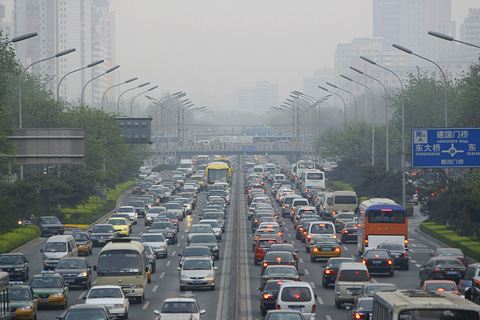Ford Motor Co, the world’s third-largest automaker, unveiled the new Fiesta small car in China, part of its plan to roll out models globally in a bid to cut development costs.
The five-door hatchback will go into production in Nanjing later this year, Ford said in a press release at the Beijing Auto Show yesterday. It didn’t provide a price range or sales target in the statement.
The new Fiesta is the first major product reflecting chief executive officer Alan Mulally’s “One Ford” program, which aims to build closer cooperation among regional units. Ford is seeking to cut costs and boost emerging market sales after posting two straight losses because of slumping US demand.

PHOTO: AP
The Dearborn, Michigan-based automaker boosted first-quarter sales in China 47 percent to 90,791 on demand for Focus compacts. The automaker also makes Mondeo sedans, S-MAX minivans and commercial vehicles in China, the world’s second-biggest auto market.
Ford is adding models and capacity in the country to catch up with rivals like General Motors Corp and Volkswagen AG that established local plants earlier. GM and Volkswagen, the two largest overseas automakers in China, both outsold Ford more than two-to-one in the first quarter.
China’s overall vehicle sales rose 21 percent in the first quarter, the China Association of Automobile Manufacturers said. GM’s sales rose 7.4 percent, while Volkswagen’s jumped 33 percent.
Changan Ford Mazda Automobile Co (長安福特馬自達汽車), Ford’s local passenger-car venture, will build the Fiesta. The venture runs plants in western Chongqing and eastern Nanjing.
It is also studying plans for a third factory.
Chongqing is the likely choice for any expansion, John Parker, Ford’s executive vice president for Asia Pacific and Africa, said on Friday.
Meanwhile, Mazda Motor Corp, a third owned by Ford Motor, will add a revamped Mazda6 and the MX-5 in China within a year, as it bids to boost sales in the world’s most populous country.

The New Taiwan dollar is on the verge of overtaking the yuan as Asia’s best carry-trade target given its lower risk of interest-rate and currency volatility. A strategy of borrowing the New Taiwan dollar to invest in higher-yielding alternatives has generated the second-highest return over the past month among Asian currencies behind the yuan, based on the Sharpe ratio that measures risk-adjusted relative returns. The New Taiwan dollar may soon replace its Chinese peer as the region’s favored carry trade tool, analysts say, citing Beijing’s efforts to support the yuan that can create wild swings in borrowing costs. In contrast,

Nvidia Corp’s demand for advanced packaging from Taiwan Semiconductor Manufacturing Co (TSMC, 台積電) remains strong though the kind of technology it needs is changing, Nvidia CEO Jensen Huang (黃仁勳) said yesterday, after he was asked whether the company was cutting orders. Nvidia’s most advanced artificial intelligence (AI) chip, Blackwell, consists of multiple chips glued together using a complex chip-on-wafer-on-substrate (CoWoS) advanced packaging technology offered by TSMC, Nvidia’s main contract chipmaker. “As we move into Blackwell, we will use largely CoWoS-L. Of course, we’re still manufacturing Hopper, and Hopper will use CowoS-S. We will also transition the CoWoS-S capacity to CoWos-L,” Huang said

Nvidia Corp CEO Jensen Huang (黃仁勳) is expected to miss the inauguration of US president-elect Donald Trump on Monday, bucking a trend among high-profile US technology leaders. Huang is visiting East Asia this week, as he typically does around the time of the Lunar New Year, a person familiar with the situation said. He has never previously attended a US presidential inauguration, said the person, who asked not to be identified, because the plans have not been announced. That makes Nvidia an exception among the most valuable technology companies, most of which are sending cofounders or CEOs to the event. That includes

INDUSTRY LEADER: TSMC aims to continue outperforming the industry’s growth and makes 2025 another strong growth year, chairman and CEO C.C. Wei says Taiwan Semiconductor Manufacturing Co (TSMC, 台積電), a major chip supplier to Nvidia Corp and Apple Inc, yesterday said it aims to grow revenue by about 25 percent this year, driven by robust demand for artificial intelligence (AI) chips. That means TSMC would continue to outpace the foundry industry’s 10 percent annual growth this year based on the chipmaker’s estimate. The chipmaker expects revenue from AI-related chips to double this year, extending a three-fold increase last year. The growth would quicken over the next five years at a compound annual growth rate of 45 percent, fueled by strong demand for the high-performance computing